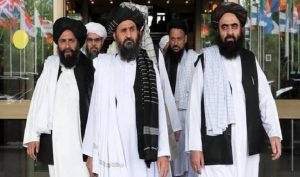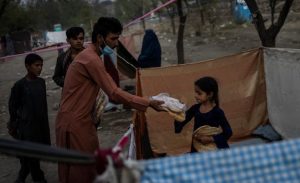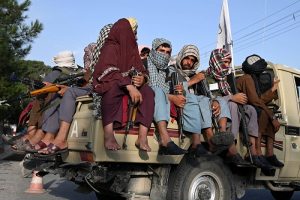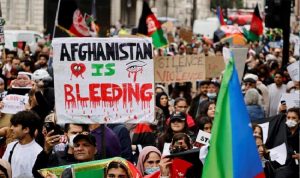03-12-2021
By SJA Jafri + Bureau Report + Agencies
 WASHINGTON/ KABUL/ ISLAMABAD: The World Bank’s board has backed transferring $280 million from a frozen trust fund to two aid agencies to help Afghanistan cope with a brewing humanitarian crisis after the US withdrawal, two sources familiar with the matter said on Wednesday, Reuters reported.
WASHINGTON/ KABUL/ ISLAMABAD: The World Bank’s board has backed transferring $280 million from a frozen trust fund to two aid agencies to help Afghanistan cope with a brewing humanitarian crisis after the US withdrawal, two sources familiar with the matter said on Wednesday, Reuters reported.
The 31 donors to the World Bank-administered Afghanistan Reconstruction Trust Fund (ARTF) must approve the transfer before the funds could flow to the World Food Program and UNICEF, the sources said. The donors were expected to meet on Friday, the sources said.
The World Bank board met informally on Tuesday to discuss transferring up to $500 million of the $1.5 billion in the ARTF to humanitarian aid agencies, people familiar with the plan previously told Reuters.
Afghanistan’s 39 million people face a cratering economy, a winter of food shortages and growing poverty three months after the Taliban seized power as the last US troops withdrew from 20 years of war.
Afghan experts have said the aid would help, but big questions remain, including how to get funds into Afghanistan without exposing any financial institutions involved to US sanctions.
 While the US Treasury has provided “comfort letters” assuring banks that they can process humanitarian transactions, concern about US sanctions continues to prevent passage of even basic supplies, including food and medicine.
While the US Treasury has provided “comfort letters” assuring banks that they can process humanitarian transactions, concern about US sanctions continues to prevent passage of even basic supplies, including food and medicine.
Any decision to redirect ARTF money requires the approval of all its donors, of which the United States has been the largest.
The White House and the Treasury had no immediate comment on the World Bank board’s endorsement of transferring the funds to the World Food Program and UNICEF.
A World Bank spokesperson confirmed the bank’s board had discussed the issue and that the donors were to meet on Friday.
The board “discussed an approach to transfer out funds from the … ARTF to humanitarian aid agencies with presence and logistics on the ground to enable basic humanitarian support directly to the people in the country,” the spokesperson said. “The ARTF Donors’ Steering Committee is scheduled to meet on Dec. 3 to consider transfers out from the fund.”
A delegation of US officials led by Special Representative for Afghanistan Thomas West called on a Taliban delegation led by Afghan Foreign Minister Amir Khan Muttaqi, in Doha, Qatar on Tuesday.
 A statement issued by spokesperson of the Ministry of Foreign Affairs of Afghanistan, Abdul Qahar Balkhi, said that Afghan FM Muttaqi exchanged views about political, economic, health, education, security and humanitarian issues, including discussions about necessary facilities in banking and liquidity availability.
A statement issued by spokesperson of the Ministry of Foreign Affairs of Afghanistan, Abdul Qahar Balkhi, said that Afghan FM Muttaqi exchanged views about political, economic, health, education, security and humanitarian issues, including discussions about necessary facilities in banking and liquidity availability.
Taking to Twitter, Balkhi said that the Afghan side assured the US officials about security and sought immediate unconditional unfreezing of Afghan reserves, ending of sanctions and blacklists, and disconnecting humanitarian issues from political considerations.
Technical groups from both sides also held separate meetings for even better progress, said Balkhi. Overall, the sessions were positive and both sides agreed to continue such meetings moving forward.
“The overall talks remained successful and the parties agreed to continue holding such meetings,” Balkhi added.
Meanwhile, another statement issued by the US State Department spokesperson said that the two delegations discussed the international community’s ongoing and urgent response to the humanitarian crisis in Afghanistan.
 “The United States remains committed to ensuring that US sanctions do not limit the ability of Afghan civilians to receive humanitarian support from the US government and international community while denying assets to sanctioned entities and individuals,” the statement read.
“The United States remains committed to ensuring that US sanctions do not limit the ability of Afghan civilians to receive humanitarian support from the US government and international community while denying assets to sanctioned entities and individuals,” the statement read.
It further stated that the US treasury department has issued general licenses to support the continued flow of humanitarian assistance to the people of Afghanistan and other activities that support basic human needs.
During the meeting, the US officials urged the Taliban to protect the rights of all Afghans, uphold and enforce its policy of general amnesty, and take additional steps to form an inclusive and representative government.
They also expressed concerns regarding the presence of Al Qaeda and Daesh in Afghanistan.
At this, the Taliban reiterated their pledge to not allow Afghan soil to be used by anyone to threaten any country.
The Taliban expressed openness to engaging with the international community on full access to education and asked for support in the education sector.
 Pressmediaofindia
Pressmediaofindia




